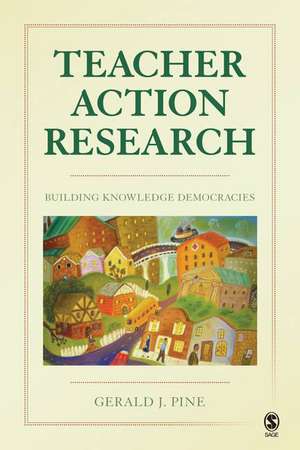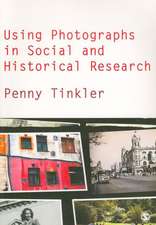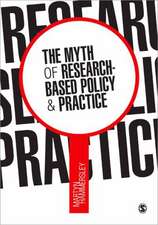Teacher Action Research: Building Knowledge Democracies
Autor Gerald J. Pineen Limba Engleză Paperback – 28 dec 2008
| Toate formatele și edițiile | Preț | Express |
|---|---|---|
| Paperback (1) | 721.78 lei 6-8 săpt. | |
| SAGE Publications – 28 dec 2008 | 721.78 lei 6-8 săpt. | |
| Hardback (1) | 1004.31 lei 6-8 săpt. | |
| SAGE Publications – 19 noi 2008 | 1004.31 lei 6-8 săpt. |
Preț: 721.78 lei
Preț vechi: 880.22 lei
-18% Nou
Puncte Express: 1083
Preț estimativ în valută:
138.13€ • 143.33$ • 115.45£
138.13€ • 143.33$ • 115.45£
Carte tipărită la comandă
Livrare economică 17-31 martie
Preluare comenzi: 021 569.72.76
Specificații
ISBN-13: 9781412964760
ISBN-10: 1412964768
Pagini: 416
Dimensiuni: 152 x 229 x 18 mm
Greutate: 0.43 kg
Ediția:1
Editura: SAGE Publications
Colecția Sage Publications, Inc
Locul publicării:Thousand Oaks, United States
ISBN-10: 1412964768
Pagini: 416
Dimensiuni: 152 x 229 x 18 mm
Greutate: 0.43 kg
Ediția:1
Editura: SAGE Publications
Colecția Sage Publications, Inc
Locul publicării:Thousand Oaks, United States
Recenzii
“I have never seen a book on this topic with such intellectual depth. It is a great book to provoke thought, reflection, and discussion in an action research class. I see this having a huge impact on the discipline, with ‘knowledge democracy’ becoming a catchphrase around which dissertations, conferences, grants, and public policies are built.”
“Its greatest strength is that it is very different from other texts on action research. I believe that it could impact the ways ‘the academy’ views the place of action research in RESEARCH. Dissertations and publications counted in things such as tenure and promotion could move toward action research and be legitimized. I believe the author’s arguments and rationales are that compelling—kudos!”
"This is a wonderful book with deep insight into the relationship between teachers' action and result of student learning. It discusses from different angles impact of action research on student learning in the classroom. Writing samples provided at the back are wonderful examples."
“Its greatest strength is that it is very different from other texts on action research. I believe that it could impact the ways ‘the academy’ views the place of action research in RESEARCH. Dissertations and publications counted in things such as tenure and promotion could move toward action research and be legitimized. I believe the author’s arguments and rationales are that compelling—kudos!”
"This is a wonderful book with deep insight into the relationship between teachers' action and result of student learning. It discusses from different angles impact of action research on student learning in the classroom. Writing samples provided at the back are wonderful examples."
Cuprins
Preface
Acknowledgments
Part I. Understanding Action Research
1. The Disconnection Between Educational Research and Practice: The Case for Teacher Action Research
Historical Context
Why the Disconnection Between Research and Practice?
Responding to the Gap: Renewing an Old Debate
Limitations of Experimental and Quasi-Experimental Design
School Context and Educational Research
The Search for School Context
Transcending the R&D Model of Knowledge Transfer
Embracing an Epistemology of Practice
Moving Toward a Knowledge Democracy
Teacher Action Research and Knowledge Democracies
Summary
2. Teacher Action Research: Collaborative, Participatory, and Democratic Inquiry
What Is Teacher Action Research?
Action Research: Changing Practice
Action Research: Teachers’ Voices
Action Research: Outcomes for Teachers
The Origins of Action Research
Approaches to Action Research
Summary
3. A Paradigm of Teacher Action Research
What Is a Paradigm?
Four Research Paradigms
Distinguishing Characteristics of an Action Research Paradigm
Challenges for Action Research
Summary
4. The Validity of Action Research
What Is Validity?
Triangulation
Validity as Inquiry
Generalizability in Action Research
Summary
5. Teacher Action Research as Professional Development
Action Research/Professional Development
Action Research as Professional Development: Teacher Outcomes
Action Research as Professional Development: Teacher Voices
Summary
Part II. Collaborative Action Research: Foundation for Knowledge Democracies
6. Collaborative Action Research
The Collaborative Nature of Action Research
The Interaction of Individual and Collaborative Action Research
Summary
7. Conditions for Building a Knowledge Democracy
Developing a "Work With" Posture
Establishing Trust
Finding Enough Time
Confronting University Versus Classroom Issues
Including Student and Parent Research Partners
Learning How to Collaborate
Summary
8. Creating Knowledge Democracies: Professional Development Schools
The Nature and Character of a Professional Development School (PDS)
The Challenges of Building a PDS as a Knowledge Democracy
Summary
Part III. Practicing Action Research
9. Fundamental Practices for Teacher Action Research
Reflection
Dialogue
Documentation
Focal Points for Observation, Journal Writing, and Reflection
Summary
10. Case Study and Teacher Action Research
What Is a Case Study?
Case Studies of Programs
Retrospective Case Studies of Curriculum
Case Study of the Individual
Summary
11. Conducting Teacher Action Research
Modest Beginnings
Finding Critical Friends
A Few Principles for Conducting Action Research
Summary
Glossary
Appendix A. Examples of Teacher Action Research Projects
From Reading Recovery to Guided Reading, by Marie A. Lennon
Why Do I Have to Know This Stuff? by Maryann Byrne
What Happens to Students' Writing When I Add a Self-Assessment Component to Each Writing Activity? by Jody McQuillan
Appendix B. Annotated Teacher Action Research Web Sites
Appendix C. Curriculum and Instruction Web Sites
References
Index
About the Author
Acknowledgments
Part I. Understanding Action Research
1. The Disconnection Between Educational Research and Practice: The Case for Teacher Action Research
Historical Context
Why the Disconnection Between Research and Practice?
Responding to the Gap: Renewing an Old Debate
Limitations of Experimental and Quasi-Experimental Design
School Context and Educational Research
The Search for School Context
Transcending the R&D Model of Knowledge Transfer
Embracing an Epistemology of Practice
Moving Toward a Knowledge Democracy
Teacher Action Research and Knowledge Democracies
Summary
2. Teacher Action Research: Collaborative, Participatory, and Democratic Inquiry
What Is Teacher Action Research?
Action Research: Changing Practice
Action Research: Teachers’ Voices
Action Research: Outcomes for Teachers
The Origins of Action Research
Approaches to Action Research
Summary
3. A Paradigm of Teacher Action Research
What Is a Paradigm?
Four Research Paradigms
Distinguishing Characteristics of an Action Research Paradigm
Challenges for Action Research
Summary
4. The Validity of Action Research
What Is Validity?
Triangulation
Validity as Inquiry
Generalizability in Action Research
Summary
5. Teacher Action Research as Professional Development
Action Research/Professional Development
Action Research as Professional Development: Teacher Outcomes
Action Research as Professional Development: Teacher Voices
Summary
Part II. Collaborative Action Research: Foundation for Knowledge Democracies
6. Collaborative Action Research
The Collaborative Nature of Action Research
The Interaction of Individual and Collaborative Action Research
Summary
7. Conditions for Building a Knowledge Democracy
Developing a "Work With" Posture
Establishing Trust
Finding Enough Time
Confronting University Versus Classroom Issues
Including Student and Parent Research Partners
Learning How to Collaborate
Summary
8. Creating Knowledge Democracies: Professional Development Schools
The Nature and Character of a Professional Development School (PDS)
The Challenges of Building a PDS as a Knowledge Democracy
Summary
Part III. Practicing Action Research
9. Fundamental Practices for Teacher Action Research
Reflection
Dialogue
Documentation
Focal Points for Observation, Journal Writing, and Reflection
Summary
10. Case Study and Teacher Action Research
What Is a Case Study?
Case Studies of Programs
Retrospective Case Studies of Curriculum
Case Study of the Individual
Summary
11. Conducting Teacher Action Research
Modest Beginnings
Finding Critical Friends
A Few Principles for Conducting Action Research
Summary
Glossary
Appendix A. Examples of Teacher Action Research Projects
From Reading Recovery to Guided Reading, by Marie A. Lennon
Why Do I Have to Know This Stuff? by Maryann Byrne
What Happens to Students' Writing When I Add a Self-Assessment Component to Each Writing Activity? by Jody McQuillan
Appendix B. Annotated Teacher Action Research Web Sites
Appendix C. Curriculum and Instruction Web Sites
References
Index
About the Author
Descriere
This book doesn't just provides the "how to" for conducting action research but also covers the origins of it and the role of it in society







